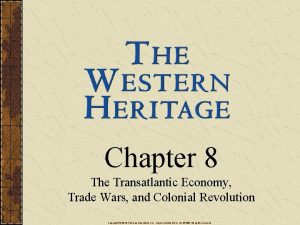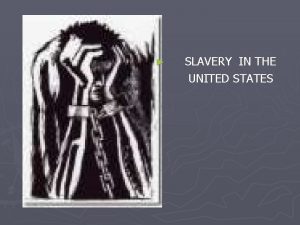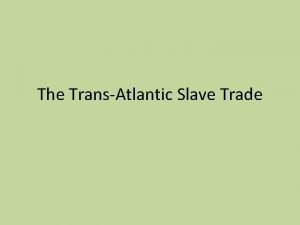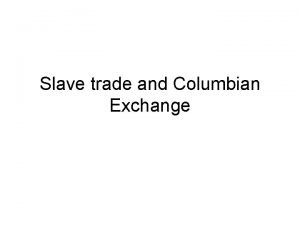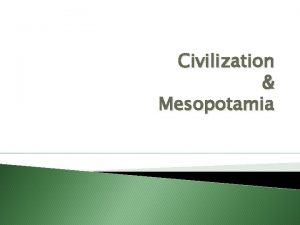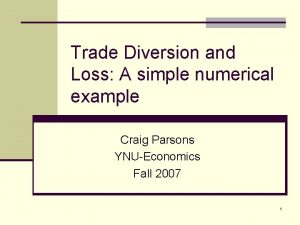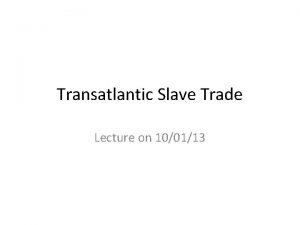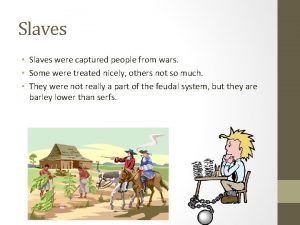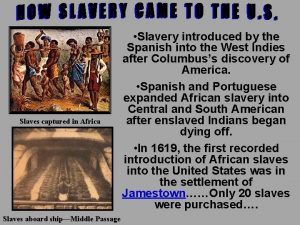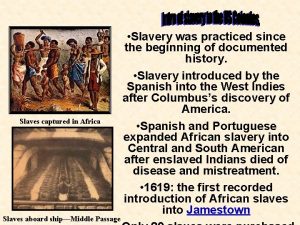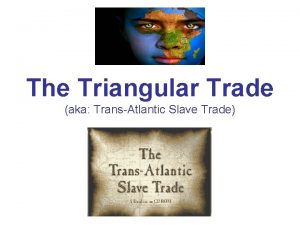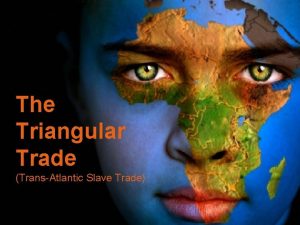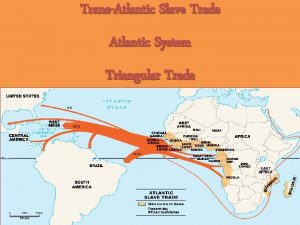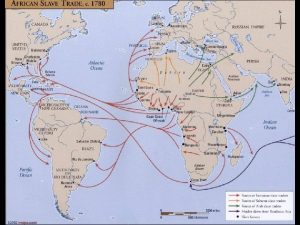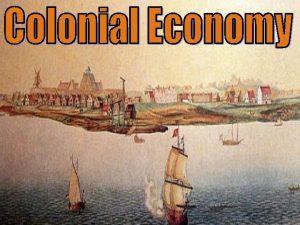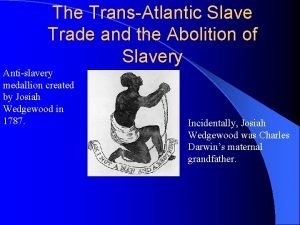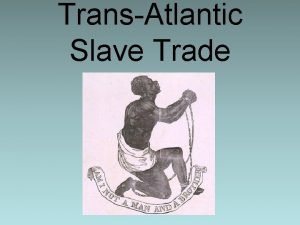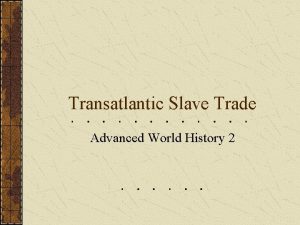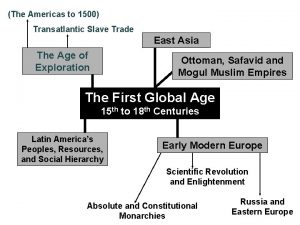TransAtlantic Trade Conditions of Trade Slaves You will
























- Slides: 24

Trans-Atlantic Trade: Conditions of Trade & Slaves You will be assigned a “specific” leg of the Triangular Trade. Read about your assigned leg of the Triangular Trade taking note on items traded, and write a brief explanation of how the people/country benefitted from those items. Then you will analyze a Primary Source document set related to your leg of the Triangular Trade. Look carefully at each source. Evaluate and list six observations/facts about the condition of enslaved Africans on your assigned leg of the Triangular Trade. You will need one person to present your notes to the class. Each individual person will want to take notes on these presentations.

Enslavement in Africa


Middle Passage


Slave Auctions in Americas


The Atlantic Slave Trade The labor needs of Europeans leads them to enslaving millions of Africans in the Americas.

Definition Slavery: social institution defined by law and custom as the most absolute and involuntary form of human servitude.

Why the Slave Trade? Sugar plantations and tobacco farms required a large supply of workers. Native Americans were once the labor force, but…

Why the Slave Trade? Sugar in England – Before 17 th century, sugar was rare in Europe. By 1700, English consumed 4 lbs per year. By 1750, consumption doubled. By 1800, it was 18 lbs. per year.

Why the Slave Trade? Flow of sugar from America depended on the flow of slaves from Africa. Average American today? 156 pounds (31 five pound bags)

Causes 1. Sugarcane plantations • Africans already exposed to disease. 2. Existence of slavery in Africa • Spread of Islam caused an increase. Why? 3. African merchants • Would capture Africans to be enslaved. Traded in exchange for gold, guns, and other goods.

Triangular Trade Connected Europe, Africa and Asia, and the American continents First leg: Europeans transported goods (guns, cloth, etc. ) to the west coast of Africa. These items traded for captured Africans. Second leg: The Africans were then sold in the West Indies in exchange for sugar, coffee, tobacco, cotton, etc. Third leg: These raw materials then went to Europe for manufacturing.


Middle Passage Middle portion of the triangular trade Packed ships as full as possible. Death was very common. Died from physical abuse and disease. About 20% of Africans died during each trip.


Life in the Americas Slave markets – captured Africans would usually go to slave markets and sold to the highest bidder.

Life in the Americas Life as a slave Rural slavery: most worked on plantations in groups of ten or more. Most work in the fields. “Big House” Some slaves worked here. Is this good or bad?

Life in the Americas Urban slavery: slaves who worked in mills and ships. Carpentry and blacksmithing

Life in the Americas Education discouraged Why? Stono Rebellion in South Carolina (near Charleston) in 1739.



Consequences of the Slave Trade Numerous cultures in Africa lost generations of people. Some were the fittest and most able. Families were torn apart. Diverse society
 Transatlantic slaves
Transatlantic slaves House slaves vs field slaves
House slaves vs field slaves Triangular trade definition
Triangular trade definition Transatlantic slave trade pictures
Transatlantic slave trade pictures Triangular trade apush
Triangular trade apush The transatlantic slave trade
The transatlantic slave trade Transatlantic slave trade
Transatlantic slave trade Transatlantic tunnel project
Transatlantic tunnel project Transatlantic cable inventor
Transatlantic cable inventor Chapter 1 three worlds meet
Chapter 1 three worlds meet Transatlantic telegraph cable apush
Transatlantic telegraph cable apush Transatlantic encounters in history of education download
Transatlantic encounters in history of education download Transatlantic telegraph cable apush
Transatlantic telegraph cable apush Slaves to righteousness
Slaves to righteousness Slaves obey your masters
Slaves obey your masters Sumerian hierarchy farmers/slaves
Sumerian hierarchy farmers/slaves Ancient egyptian slaves
Ancient egyptian slaves How were roman slaves treated
How were roman slaves treated In the 1850s, why did many runaway slaves go to canada? *
In the 1850s, why did many runaway slaves go to canada? * Slaves wife
Slaves wife If you are driving under adverse conditions
If you are driving under adverse conditions Trade diversion and trade creation
Trade diversion and trade creation Umich
Umich Which is the most enduring free trade area in the world?
Which is the most enduring free trade area in the world? The trade in the trade-to-gdp ratio
The trade in the trade-to-gdp ratio
